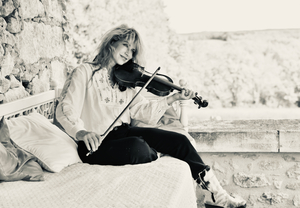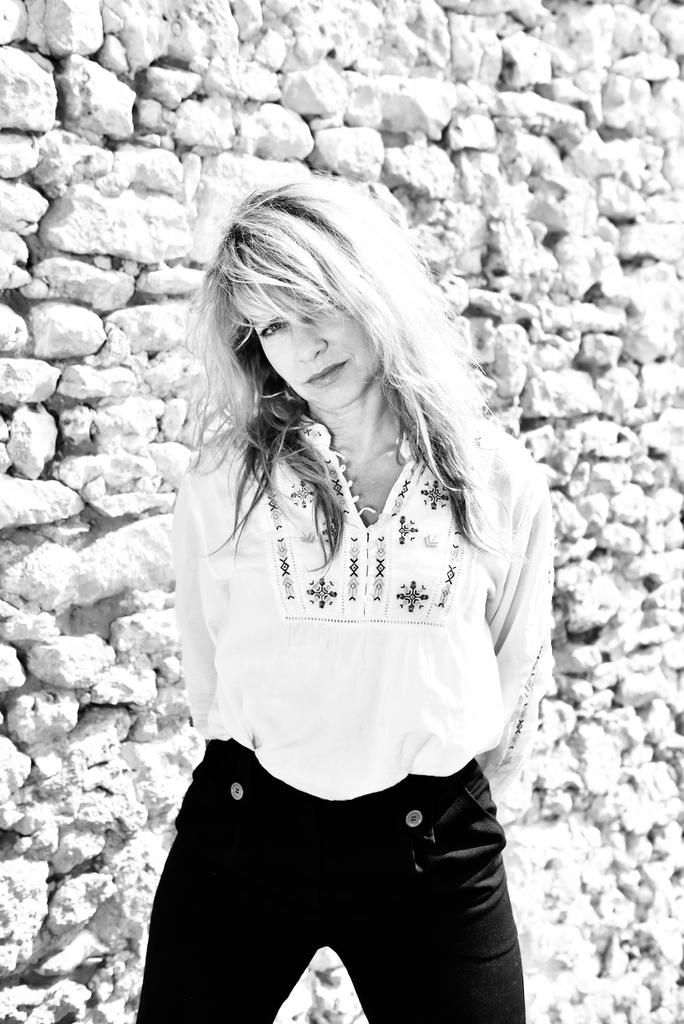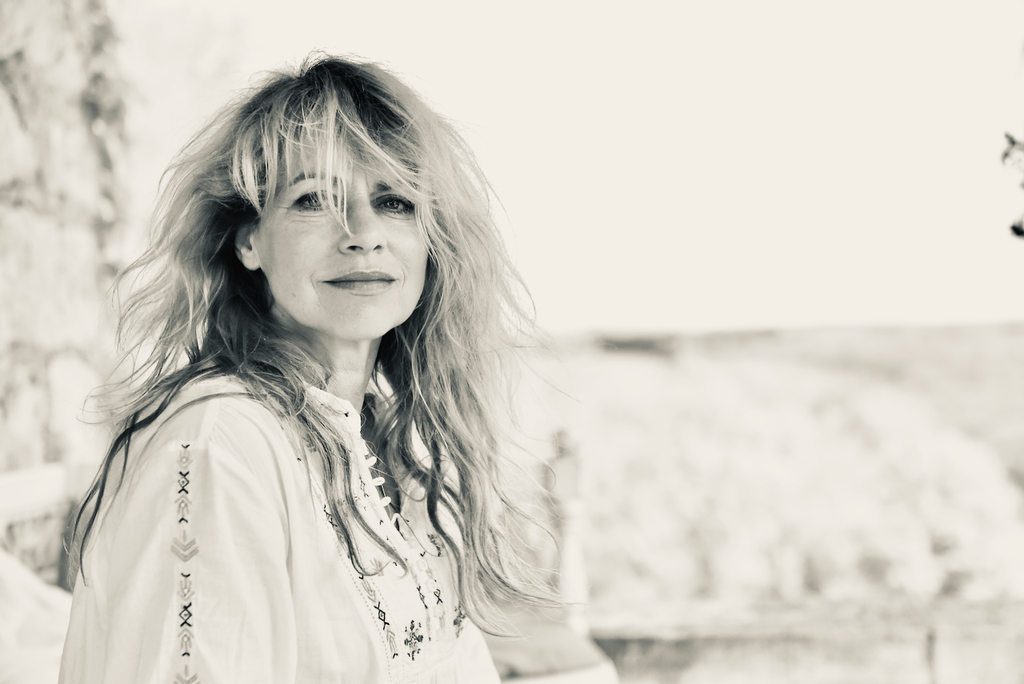Her life has become what Ellen ten Damme (54) once dreamed of: free, exciting and she can make a living from her music. Like a troubadour, she is touring the country in the coming months with her new show Barock. 'Only in my French home do I do normal things.'
1. I am allowed to take myself seriously
'As a 3-year-old, I was already hanging from the highest lamppost. I wanted to have adventures, dreamed of travelling the world as a troubadour. Even as a child, I was in bands. Actually, I never did anything but sing, make music, play. Making a show and going on tour with a whole band like that, like now with Barock, I find every time magical. Performing live, that dynamic with the expectant audience, energises me. I love the tension that something can always go wrong. Then a chain breaks from my bellydance outfit and all those beads clatter across the stage, exactly where I have to tap dance later. At a moment like that, I have to think of a quick solution: sweeping things aside with a jacket without the audience noticing. I feel alive when I am on stage.
Over the years, I have become more and more serious in my profession. When I was in my thirties, I would sometimes start a performance broke; I was casual about my work, a bit cool, as if I didn't care that much. But now I want to get better and better and perform. I took singing lessons and nowadays I do exercises an hour before my performance to warm up my voice. And I am getting better. For instance, I recently discovered that I can sing higher than I thought, and in a controlled way. That gives me satisfaction. I'm almost 55, but I don't feel like I'm at my best yet.
2. Small things can also move

'As a child, I mainly identified with my father, even preferred to be a boy. Besides working at a housing association, he did all sorts of things: he played football, was a checkers teacher, sat on all sorts of committees and was politically active. An intelligent man who was at the centre of the world, the type of absent-minded professor, a bit maladjusted. He was always busy and out and about a lot - that was the kind of life I wanted later on.
He died a few years ago, at 83. What I miss most are his jokes - he was a comic nut. He used to call me almost every day. Sometimes he would just shout, "Look at the moon now!" and then hang up again, without having even said "hello".
From him I learnt to see the beauty in the small things. I longed for a grand and compelling life, but he also taught me to have an eye for the details in existence. Through him, I saw the beauty of the stars and moon, nature, birds. He was someone who suddenly stopped in the middle of the road: look, a buzzard! I find myself doing the same more and more often. Then I point out a friend to a beautiful robin: look there! I can be moved by an old man on a bench. Many people are not interested in such things at all, but I am glad he has taught me to look so attentively and enjoy the world around me.'
3. Life can be complete without children
'My parents divorced when I was 9. My brother, sister and I stayed in our house with my mother. She was super caring to us, and I think she deserves a big compliment for how she did it. But at the time, in my eyes, she was taking care of the crap jobs like housework and my father was leading a much nicer life. I thought: I'm never going to get married and leave children too, because then you're only concerned with that.
At one point I had a fine, long-term relationship [with musician Robin Berlin, ed.] and of course I was thinking about having children - as a woman, you have a deadline. But Robin necessarily didn't want them and I thought our relationship was more important, so I thought: fine, then don't. Besides, girlfriends who did have a family often complained about how tired they were and their lack of free time. What a nice life I have, I then realised. I loved the freedom to go wherever I wanted. I kept postponing the final decision.

When I was diagnosed with breast cancer in 2005 and given chemo and hormone therapy, I was advised not to get pregnant for five years. After that period, I thought we should talk about it anyway, as I was now in my early 40s. But Robin clammed up, and he left me shortly afterwards. Whether the subject of children was the reason, I don't even know exactly - he found it hard to talk about his feelings. Maybe he got scared and thought: get out.
His departure was completely unexpected. Now I had no children, but neither did he. Some time later, just to be sure, I had a test to see if I could still conceive in a normal way, but the chances were slim; I was already too old. OK, I thought, then that issue is also solved. Done.
If I had had children, I'm sure I would have loved it, but I don't regret not having them. My life is fun and complete that way too. Maybe it helps that I have a lot of family and friends without children. In the area where I grew up, it was normal for people to get married when they were in their 20s. Then they have their first child, buy a house. Then a second child comes along, they buy a bigger house. Then they have a midlife crisis, cheat and then usually divorce. I have no judgment on that, because if so many people live that kind of life, I guess it's comfortable. But I wouldn't want to swap.'
4. 'Normal' is nice too sometimes
'My six-year-old younger sister is mentally disabled. Judith started talking late, and she was physically very active, so we had to watch her every second. She used to raid the fridge while everyone was sleeping. My mother found the craziest things in her stools. Balloons, but also papers. Plastic. Pieces of Vara guide.
It was my job to look for her when we went out to eat. I would scour the neighbourhood to see on which driveway her little bike was, because she scavenged sweets and food everywhere and from everyone. If you went shopping with her in the supermarket, she would pull everything from the shelves; it regularly happened that she turned blue because she almost choked on liquorice due to her gluttony.
Judith was funny and cheerful and chatted with everyone, and still is. When I walk through the village with her, she is greeted by everyone. She lives in assisted living and manages very well. Although we are similar in exuberance, her life is the opposite of mine; in her existence, everything is extremely regulated. When I visit, she wants to know exactly what time. And if you say you are coming at four, you really have to be there at four, otherwise she gets confused. She is satisfied with little and has no ambition. It is precisely the ordinary things that are very important to her. Her pet, for instance: when she sends a card, I always get her cat's greetings, too. Groceries she does between one and two. At three she has tea with a biscuit. On the contrary, I always prefer to skip those ordinary everyday things. I once aspired to go through life as a kind of Jesus; I liked the idea of being satisfied with what I was offered. That works out well, because as an artist you get something to eat and drink everywhere, and flowers afterwards too. I hardly ever do any shopping because I am on the road so much. I usually eat breakfast and lunch outside - I am very much into convenience.
Yet in recent years I have come to appreciate the normal, everyday things of life more. About eight years ago, I bought a house in France. The area reminds me of Winterswijk, where my grandparents lived: an old-fashioned, rural region, with chickens roaming free and wild boars stalking through your garden. You don't really find the silence of that place anywhere in the Netherlands any more. I like the alternation between life here and there. When I'm in France, I do normal things. Cooking, because there aren't that many restaurants around. Mowing the lawn, tending the garden. Picking fruit. Baking a cake. I have to admit: I still don't get round to it much. But when I do the laundry or go shopping, I can really enjoy it sometimes.
5. Talking is important

'I prefer not to talk about my feelings or things that don't go well. I wasn't taught that in my childhood. Now people from the eastern part of the country are more reserved in their expressions anyway, but in our family they didn't talk about feelings at all. My parents hadn't learned that themselves either.
When something bothers me, I keep my mouth shut and always hope it will work itself out. Until at some point the bomb bursts or I vent my annoyance by whining about something else. For example, I might be jealous when my boyfriend goes to a party alone, but when he gets home I start moaning about why he didn't do the dishes.
I am not very strong verbally; I find it difficult to express myself precisely, and what I say sometimes comes across as more cynical or unkind than I mean it. Although I am very language-sensitive in my music, in daily life I am clumsy with words. Just this Christmas, I had a conversation with my mother; she told me she was tired and didn't feel like visiting much and cooking. I suggested going out for dinner, but she didn't like that either. I said, "I think I'll just not come and let you rest, because I don't really feel welcome." I didn't mean that in a rotten way, but my words hurt her: "What, not welcome? You're always welcome!" Such discomfort is created by words, and I find that difficult. I know I need to learn to speak better.
Since the nagging mainly occurs when I am tired, I do well to make sure I am rested. Therefore, I asked my friend, "If you notice that I start whining, please tell me: go to sleep." Because the next day, there is usually nothing more.'
6. I can deal with any reality
'In 2005, I got breast cancer for the first time. I did not feel sick and suffered little from the treatments. At the beginning of our relationship, Robin also had cancer. I took care of him for a year so I was already familiar with the disease and treatments, and that made a difference when I got it myself. I knew what to expect and that you can also recover from it.
Five years ago, a tumour was discovered for the second time, this time in my other breast. I had minor surgery and a series of radiations. The day after the operation, I was back on stage. I hardly noticed, so when the treatments were over, I thought: so, done.
That may sound rather down-to-earth, but I have found that as long as I have clarity, I can actually deal with any reality. The hardest part of having cancer was the uncertainty after I heard that something had been found and that further examination was needed. The days I didn't have the results yet, those were shitty days. And sometimes I thought to myself that I would probably die this time. But when things became clear and I knew what was going to happen, I calmed down.
I do tend to get nervous the week before a check-up. I therefore prefer to always schedule that appointment after a series of performances, so that I have at least been able to finish it if bad news comes, as was the case recently when it appeared to have recurred.
I have become realistic. You can never know how things will turn out. If someone says to me, "In five years, we'll do this again," I immediately follow that up with, "If I'm still around then."
That stronger sense of death also has a positive side. Many people who experience something like this want to radically change their lives afterwards. But I just realised that my life turned out exactly the way I wanted. I was able to do everything I always dreamed of. So even if I were to die, I could be at peace with that. And in the meantime, I enjoy my life even more intensely as it is.'
About Ellen ten Damme
Singer and musician Ellen ten Damme (born 7 October 1967) grew up in Roden, in the province of Drenthe. After the Kleinkunstacademie in Amsterdam, she started acting in various television series (including Plea, Jiskefet, Flikken Maastricht and Tatort) and films, such as All Stars and No Trains No Planes. After her first record Kill Your Darlings (1994 followed many more English- and Dutch-language CDs, including I Am Here, Impossible Girl, It rained sun and Everything turns. Do you dare, made in collaboration with Ilja Leonard Pfeijffer, became a gold record. The albums Paris, Berlin and Casablanca she recorded live at the Concertgebouw. Ten Damme often performed at De Parade, worked for years as an actress and singer in Germany and toured with major theatrical shows, such as Cirque Stiletto and Paris-Berlin. From September, she will tour with the show Barock. Ten Damme has a boyfriend, they do not live together.
See www.ellentendamme.nl for the playlist and tickets.
